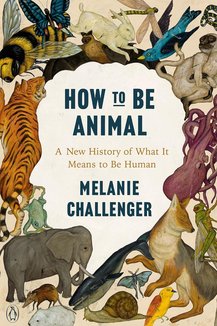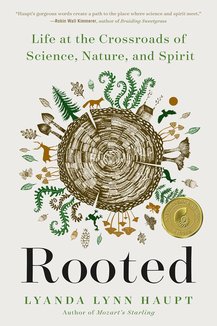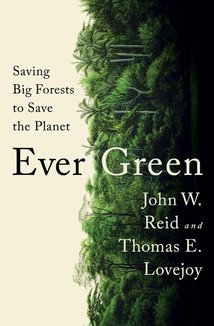Recommended Books

How to Be Animal: A New History of What It Means to Be Human
Author:
Melanie Challenger
ISBN 13:
978-0143134350
“A remarkable combination of biology, genetics, zoology, evolutionary psychology and philosophy.” —Richard Powers, Pulitzer Prize-winning author of The Overstory “A brilliant, thought-provoking book.” —Matt Haig, New York Times bestselling author of The Midnight Library A wide-ranging take on why humans have a troubled relationship with being an animal, and why we need a better one Human are the most inquisitive, emotional, imaginative, aggressive, and baffling animals on the planet. But we are also an animal that does not think it is an animal. How well do we really know ourselves? How to Be Animal tells a remarkable story of what it means to be human and argues that at the heart of our existence is a profound struggle with being animal. We possess a psychology that seeks separation between humanity and the rest of nature, and we have invented grand ideologies to magnify this. As well as piecing together the mystery of how this mindset evolved, Challenger's book examines the wide-reaching ways in which it affects our lives, from our politics to the way we distance ourselves from other species. We travel from the origin of homo sapiens through the agrarian and industrial revolutions, the age of the internet, and on to the futures of AI and human-machine interface. Challenger examines how technology influences our sense of our own animal nature and our relationship with other species with whom we share this fragile planet. That we are separated from our own animality is a delusion, according to Challenger. Blending nature writing, history, and moral philosophy, How to Be Animal is both a fascinating reappraisal of what it means to be human, and a robust defense of what it means to be an animal.

Rooted: Life at the Crossroads of Science, Nature, and Spirit
Author:
Lyanda Lynn Haupt
ISBN 13:
978-0316426497
NATIONAL BESTSELLER Deepen your connection to the natural world with this inspiring meditation, "a path to the place where science and spirit meet" (Robin Wall Kimmerer). In Rooted , cutting-edge science supports a truth that poets, artists, mystics, and earth-based cultures across the world have proclaimed over millennia: life on this planet is radically interconnected. Our bodies, thoughts, minds, and spirits are affected by the whole of nature, and they affect this whole in return. In this time of crisis, how can we best live upon our imperiled, beloved earth? Award-winning writer Lyanda Lynn Haupt’s highly personal new book is a brilliant invitation to live with the earth in both simple and profound ways—from walking barefoot in the woods and reimagining our relationship with animals and trees, to examining the very language we use to describe and think about nature. She invokes rootedness as a way of being in concert with the wilderness—and wildness—that sustains humans and all of life. In the tradition of Rachel Carson, Elizabeth Kolbert, and Mary Oliver, Haupt writes with urgency and grace, reminding us that at the crossroads of science, nature, and spirit we find true hope. Each chapter provides tools for bringing our unique gifts to the fore and transforming our sense of belonging within the magic and wonder of the natural world.

Ever Green: Saving Big Forests to Save the Planet
Authors:
John W. Reid
,
Thomas E. Lovejoy
ISBN 13:
978-1324006039
One of Kirkus Review 's Best Nonfiction Books of 2022 Clear, provocative, and persuasive, Ever Green is an inspiring call to action to conserve Earth’s irreplaceable wild woods, counteract climate change, and save the planet. Five stunningly large forests remain on Earth: the Taiga, extending from the Pacific Ocean across all of Russia and far-northern Europe; the North American boreal, ranging from Alaska’s Bering seacoast to Canada’s Atlantic shore; the Amazon, covering almost the entirety of South America’s bulge; the Congo, occupying parts of six nations in Africa’s wet equatorial middle; and the island forest of New Guinea, twice the size of California. These megaforests are vital to preserving global biodiversity, thousands of cultures, and a stable climate, as economist John W. Reid and celebrated biologist Thomas E. Lovejoy argue convincingly in Ever Green . Megaforests serve an essential role in decarbonizing the atmosphere―the boreal alone holds 1.8 trillion metric tons of carbon in its deep soils and peat layers, 190 years’ worth of global emissions at 2019 levels―and saving them is the most immediate and affordable large-scale solution to our planet’s most formidable ongoing crisis. Reid and Lovejoy offer practical solutions to address the biggest challenges these forests face, from vastly expanding protected areas, to supporting Indigenous forest stewards, to planning smarter road networks. In gorgeous prose that evokes the majesty of these ancient forests along with the people and animals who inhabit them, Reid and Lovejoy take us on an exhilarating global journey. 45 photos and 6 maps
Find on:
 Amazon
Amazon